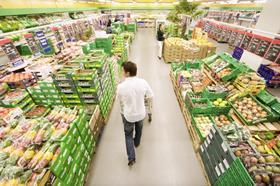
Germany’s grocery market is forecast to be worth €259bn by 2021, a growth rate of 10.5 per cent, according to new figures released by international grocery research organisation IGD.
The IGD report revealed that all of Germany’s major grocery channels are expected to grow over the next four years, primarily driven by inflation combined with population growth, plus retailers investing in certain channels.
In addition, the forecast predicted that the online channel is set to grow the most, by 244.4 per cent, albeit from a small base, while convenience will be the next fastest-growing channel at 36.4 per cent and discount will remain the largest channel in Germany with relatively strong growth levels to 2021.
Jon Wright, IGD’s EMEA region manager, identified several key trends that are helping to drive growth across Germany’s grocery market.
“Online is gaining traction across Germany,' said Wright. 'While the country’s retailers have been slower than others across Europe to focus on their multichannel strategies, many are now starting to invest in and innovate more with their online offer, including click and collect services, and a number of online-only operators, for example Mytime.de, have launched in the market. Meanwhile, Amazon Pantry has been introduced in Germany, and there is media speculation that AmazonFresh will launch in 2017. All of this is helping to drive growth.
“The convenience channel is also growing,” he continued. “New convenience and forecourt stores are opening across Germany and convenience food is now being offered in other store types such as supermarkets and discounters, as all retailers look to compete to meet shoppers’ needs for food-to-go as well as food-for-later.
“There are also lots of new retail concepts emerging across Germany’s grocery market, which until recently has been traditionally dominated by discounters and supermarkets,' Wright noted. 'For example, we have recently seen the entry of new players targeting specific customers and providing alternatives to the usual stores. Veganz is a great example, with a number of stores across the country, while Eataly has also recently entered the German market.
“Many of Germany’s retailers are also investing in new and refreshed shopping environments,' he outlined. 'For example, Aldi has launched its ‘Future store’ concept, which has a look and feel more similar to that of a supermarket. Edeka and Rewe continue to create innovative and exciting shopping destinations for customers and Real has recently launched its new Markthalle concept.”
Finally, with one of the highest shares of private label sales in Europe, this part of Germany’s grocery market is only expected to grow over the next few years, according to IGD.
“As the home of the discounters, which typically have up to 90 per cent share of private label products, Germany’s shopper is used to private label goods and looks for them in a wide variety of categories,' added Wright. 'Share of private label is rising and we expect that to continue, as retailers drive innovation and extend their ranges, particularly in the growing areas of organic (BIO), free from, vegetarian, vegan and ready meals.”



